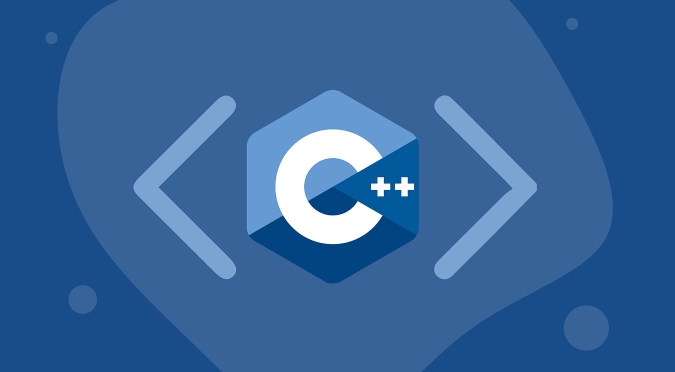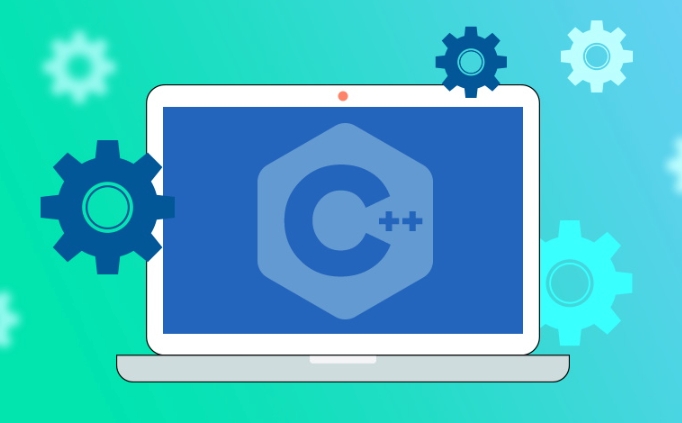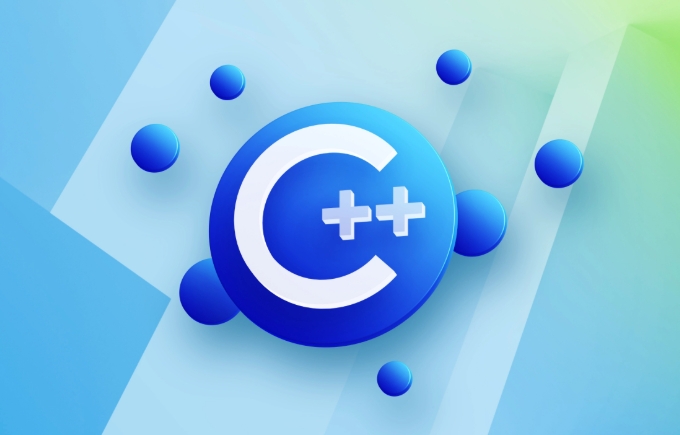Using Fold Expressions in C
The collapsed expression in C 17 simplifies the processing of variadic parameter templates by applying binary operators. It supports single and binary folding forms, such as (args ...) and (args ... init), which can intuitively implement operations such as accumulation, splicing, etc.; 1. It can be used to accumulate numerical values or splicing strings, such as sum(1, 2, 3) returns 6, join function splicing parameters; 2. Check multiple conditions, such as all_true to determine whether it is true; 3. Print multiple parameters and use comma operators to output in sequence; when using it, pay attention to type consistency, empty parameter package processing and operator priority issues, such as using initial values to avoid compilation errors, and brackets ensure correct parsing.

C 17 introduces Fold Expressions, which provides a concise and powerful way to deal with variadic templates. If you have used std::make_tuple or written code for parameter package expansion, you will find that folding expressions can make these operations clearer and more intuitive.

What is a fold expression?
Collapse expressions allow you to apply a binary operator to all elements in a parameter package, thus avoiding manually expanding the parameter package. It is suitable for unary operations (such as printing all parameters) and binary operations (such as summing, splicing strings, etc.).
Syntax, fold expressions are divided into two forms:

- One dollar fold : for example
(args ...) - Binary folding : for example
(args ... init)
Here ... is the collapse operator, which tells the compiler that this is a collapse operation of a parameter package.
To give a simple example:

template<typename... Args>
auto sum(Args... args) {
return (args ...);
} Calling sum(1, 2, 3) will return 6 . Does it look cleaner than before?
Common usage scenarios for folding expressions
1. Accumulate or combine multiple values
This is the most intuitive application scenario. For example, you want to add multiple numbers or splice multiple strings:
template<typename... Args>
std::string join(Args... args) {
return (... args); // Pay attention to the order, combine from left to right} Note that above is (... args) , that is, left folding. If you write (args ...) , that's OK, but by default it's right-folding, which can cause type mismatch issues, especially when different types are mixed.
2. Check whether multiple conditions are met
You can use a collapse expression to determine whether a set of values meets a certain condition. For example:
template<typename... Args>
bool all_true(Args... args) {
return (args && ...);
} Calling all_true(true, false, true) in this way will return false .
If you want to check if at least one is true? Then change it to || :
return (args || ...);
This writing method is very practical in scenarios such as writing policy mode, permission checking, and configuration verification.
3. Print multiple parameters
Sometimes you need to output multiple parameters to the console or log in sequence:
template<typename... Args>
void print_all(Args... args) {
((std::cout << args << " "), ...);
}Here, the comma operator is used, first execute the output on the left, and then continue to collapse the parameters on the right. This way, all parameters can be output in turn.
Things to note when using fold expressions
Type consistency is important : a folding expression requires that the parameter types be unified during operation. For example, you cannot add
intandstd::stringdirectly.Empty parameter package problem : If you pass in an empty parameter package, expressions like
(args ...)will cause compilation errors. The solution is to use binary collapse and specify the initial value:return (args ... 0); // Safe version, return 0 even if there are no parameters
Priority and brackets : The operator priority involved in a collapse expression is error-prone. To be on the safe side, it is best to add brackets:
(args * ...) // Correct args * ... // Error! Need brackets
Basically that's it. Folding expressions are not a must-have, but they do simplify many common tasks in template programming, and the code written is clearer and easier to understand. If you often write template code, especially when dealing with parameter packages, you might as well give it a try.
The above is the detailed content of Using Fold Expressions in C. For more information, please follow other related articles on the PHP Chinese website!

Hot AI Tools

Undress AI Tool
Undress images for free

Undresser.AI Undress
AI-powered app for creating realistic nude photos

AI Clothes Remover
Online AI tool for removing clothes from photos.

Clothoff.io
AI clothes remover

Video Face Swap
Swap faces in any video effortlessly with our completely free AI face swap tool!

Hot Article

Hot Tools

Notepad++7.3.1
Easy-to-use and free code editor

SublimeText3 Chinese version
Chinese version, very easy to use

Zend Studio 13.0.1
Powerful PHP integrated development environment

Dreamweaver CS6
Visual web development tools

SublimeText3 Mac version
God-level code editing software (SublimeText3)
 Comparing Java Frameworks: Spring Boot vs Quarkus vs Micronaut
Aug 04, 2025 pm 12:48 PM
Comparing Java Frameworks: Spring Boot vs Quarkus vs Micronaut
Aug 04, 2025 pm 12:48 PM
Pre-formanceTartuptimeMoryusage, Quarkusandmicronautleadduetocompile-Timeprocessingandgraalvsupport, Withquarkusoftenperforminglightbetterine ServerLess scenarios.2.Thyvelopecosyste,
 Comparing Java Build Tools: Maven vs. Gradle
Aug 03, 2025 pm 01:36 PM
Comparing Java Build Tools: Maven vs. Gradle
Aug 03, 2025 pm 01:36 PM
Gradleisthebetterchoiceformostnewprojectsduetoitssuperiorflexibility,performance,andmoderntoolingsupport.1.Gradle’sGroovy/KotlinDSLismoreconciseandexpressivethanMaven’sverboseXML.2.GradleoutperformsMaveninbuildspeedwithincrementalcompilation,buildcac
 Yii Developer: Mastering the Essential Technical Skills
Aug 04, 2025 pm 04:54 PM
Yii Developer: Mastering the Essential Technical Skills
Aug 04, 2025 pm 04:54 PM
To become a master of Yii, you need to master the following skills: 1) Understand Yii's MVC architecture, 2) Proficient in using ActiveRecordORM, 3) Effectively utilize Gii code generation tools, 4) Master Yii's verification rules, 5) Optimize database query performance, 6) Continuously pay attention to Yii ecosystem and community resources. Through the learning and practice of these skills, the development capabilities under the Yii framework can be comprehensively improved.
 How to read a CSV file in Java?
Aug 03, 2025 am 11:56 AM
How to read a CSV file in Java?
Aug 03, 2025 am 11:56 AM
Using the OpenCSV library is the best choice for reading CSV files. It can handle complex situations and supports multiple features; 2. For simple CSV files, you can use Java's built-in BufferedReader combined with split method; 3. If you need more flexible format control or have used Apache components, you can choose Apache CommonsCSV. OpenCSV is recommended for its simplicity, robustness and ability to handle CSV problems in real scenarios.
 Volume keys on keyboard not working
Aug 05, 2025 pm 01:54 PM
Volume keys on keyboard not working
Aug 05, 2025 pm 01:54 PM
First,checkiftheFnkeysettingisinterferingbytryingboththevolumekeyaloneandFn volumekey,thentoggleFnLockwithFn Escifavailable.2.EnterBIOS/UEFIduringbootandenablefunctionkeysordisableHotkeyModetoensurevolumekeysarerecognized.3.Updateorreinstallaudiodriv
 Computed properties vs methods in Vue
Aug 05, 2025 am 05:21 AM
Computed properties vs methods in Vue
Aug 05, 2025 am 05:21 AM
Computed has a cache, and multiple accesses are not recalculated when the dependency remains unchanged, while methods are executed every time they are called; 2.computed is suitable for calculations based on responsive data. Methods are suitable for scenarios where parameters are required or frequent calls but the result does not depend on responsive data; 3.computed supports getters and setters, which can realize two-way synchronization of data, but methods are not supported; 4. Summary: Use computed first to improve performance, and use methods when passing parameters, performing operations or avoiding cache, following the principle of "if you can use computed, you don't use methods".
 How to compare two strings in Java?
Aug 04, 2025 am 11:03 AM
How to compare two strings in Java?
Aug 04, 2025 am 11:03 AM
Use the .equals() method to compare string content, because == only compare object references rather than content; 1. Use .equals() to compare string values equally; 2. Use .equalsIgnoreCase() to compare case ignoring; 3. Use .compareTo() to compare strings in dictionary order, returning 0, negative or positive numbers; 4. Use .compareToIgnoreCase() to compare case ignoring; 5. Use Objects.equals() or safe call method to process null strings to avoid null pointer exceptions. In short, you should avoid using == for string content comparisons unless it is explicitly necessary to check whether the object is in phase.
 python logging to file example
Aug 04, 2025 pm 01:37 PM
python logging to file example
Aug 04, 2025 pm 01:37 PM
Python's logging module can write logs to files through FileHandler. First, call the basicConfig configuration file processor and format, such as setting the level to INFO, using FileHandler to write app.log; secondly, add StreamHandler to achieve output to the console at the same time; Advanced scenarios can use TimedRotatingFileHandler to divide logs by time, for example, setting when='midnight' to generate new files every day and keep 7 days of backup, and make sure that the log directory exists; it is recommended to use getLogger(__name__) to create named loggers, and produce







